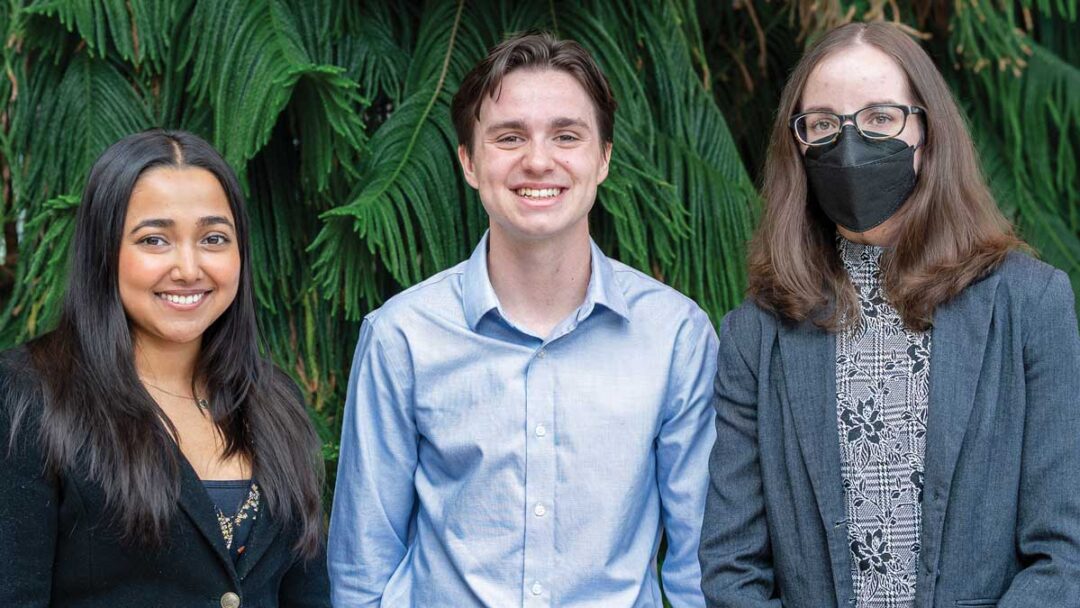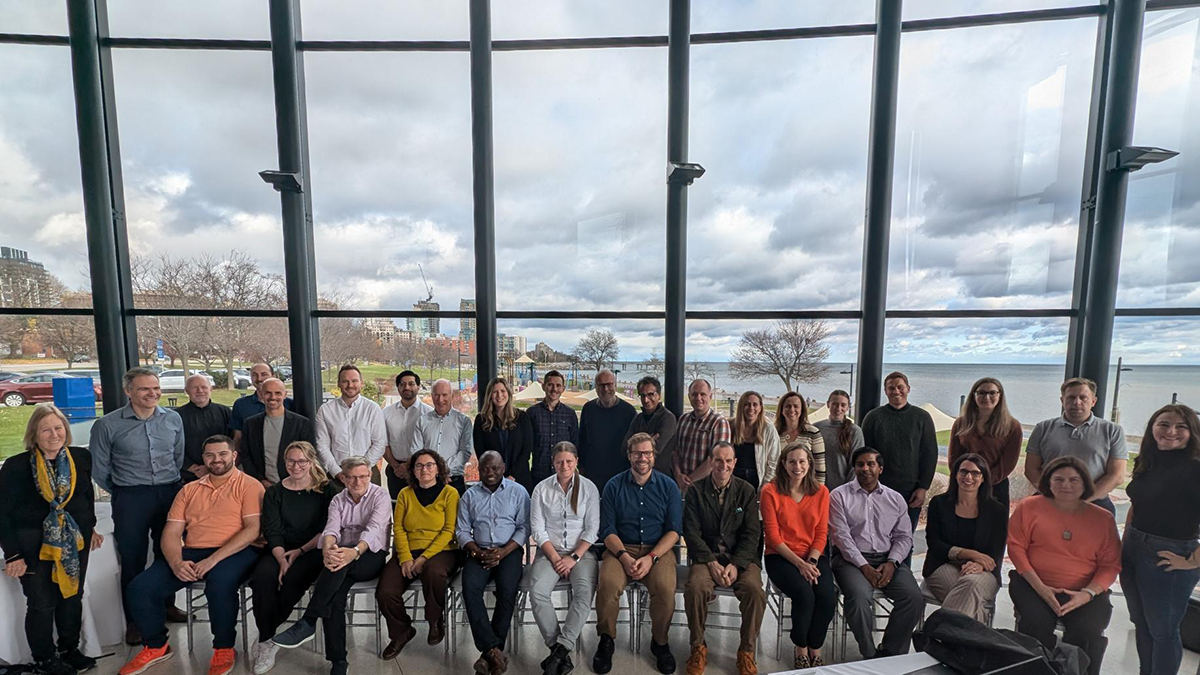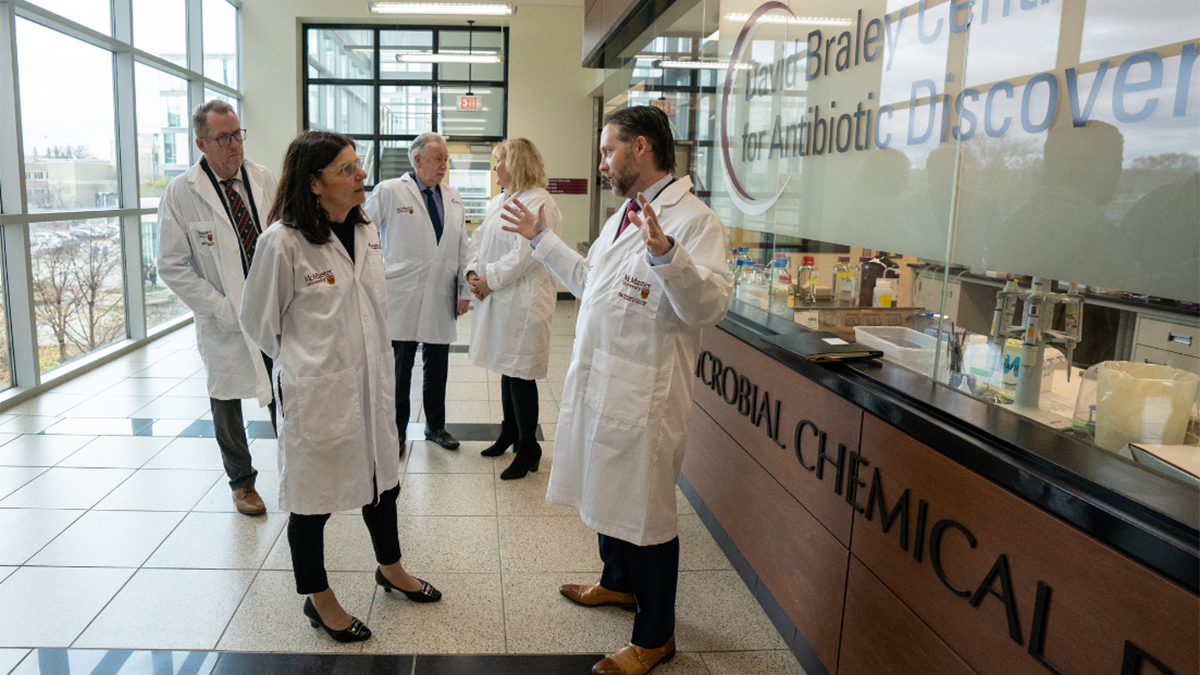McMaster trainees are advancing equity in vaccine science in new Global Nexus-Pfizer partnership

Barriers to access, representation, and groups vulnerable to infection will all be top-of-mind in a series of new trainee-led vaccine studies.
Supported by a $500,000 gift from Pfizer Canada, McMaster University’s Global Nexus is challenging young scholars to address critical health equity gaps in the development and delivery of next-generation vaccines.
The new fellowship program is designed to not only promote training of learners from equity-deserving groups, but also to ensure emerging vaccine research considers populations who are especially vulnerable to infectious diseases.
Graduate students Sudeshna Dhar and Joshua Russell and postdoctoral fellow Jessica Breznik comprise the inaugural cohort of Global Nexus/Pfizer Fellows, and each brings different experiences and expertise to the program. Here, they share their research goals and reflect on the significance of their new fellowships.

Sudeshna Dhar
A novel polymer film-based vaccination platform
When Sudeshna Dhar moved to Canada from her small island home in Fiji, she embraced the idea of studying in a country renowned for medical innovation and health care. But as the COVID-19 pandemic swept across the country, she quickly saw that Canada, despite its reputation in the space, was not at all invulnerable to health equity and access issues.
“Developing nations — including those within the Pacific — continue to face barriers to health-care access, and communities face disproportionate standards of care based on sociocultural backgrounds and socioeconomic status,” she says. “During my time here, however, I have learned that these disparities and barriers can also persist in developed nations, like Canada.”
The third-year PhD student, who studies infection and immunity in McMaster’s Medical Sciences Program, says she hopes to help address systemic health inequities through her own research.
Recently named a Global Nexus/Pfizer Graduate Fellow, Dhar is working on the development of a novel mucosal vaccination platform based on thin polymer films.
“This is a collaborative effort between chemists, engineers, and immunologists at McMaster,” she says. “These films rapidly dissolve in the mouth to deliver vaccine components orally, inducing immunity at the site at which we are likely to encounter pathogens.”
Dhar and her collaborators are working to ensure that their polymer film vaccines will have reliable shelf-life outside of the freezer, which, she says, would “directly address the cold chain infrastructure shortages that hinder vaccination campaigns in resource-limited communities.”
Additionally, because their film-based vaccine will not require needles or syringes, it is much easier to administer than conventional vaccines are, which removes the need for specialized equipment and personnel during administration.
“Our project aims to bridge the gaps found within conventional vaccination platforms, ensuring more rapid and equitable access to vaccines in communities worldwide,” she says.
Dhar, who is conducting this research under the co-supervision of Alex Adronov (Department of Chemistry and Chemical Biology, Faculty of Science) and Mark Larché (Department of Medicine, Faculty of Health Sciences), says that the Global Nexus/Pfizer Fellowship Program is a meaningful step toward ensuring that equity considerations are incorporated into research more broadly.
“Embedding equity considerations into research is not just a moral imperative, it is an obligation,” she says. “We must ensure that the innovations that come from research can meaningfully and sustainably impact all communities, regardless of background.”

Joshua Russell
Vaccines and antivirals for influenza viruses
In 2022, Joshua Russell came to McMaster from Trent University to participate in the pilot year of the Biochemistry and Biomedical Sciences Summer Scholars Program (SSP). He says the program, which strives to promote diversity in STEM research settings, gave him a sense of belonging in science and the confidence to pursue his own research career.
Now, just two years later, Russell has been named a Global Nexus/Pfizer Graduate Fellow for his important research into influenza vaccines.
“This Global Nexus/Pfizer fellowship represents a continuation of the training that I was first exposed to as a Summer Scholar,” Russell says. “It is allowing me to take the next step in advancing my own research, while also giving me the opportunity to continue representing and advocating for the LGBTQIA+ community in the field of vaccinology.”
Russell will spend his fellowship working in the laboratory of Matthew Miller, executive director of Global Nexus and scientific director of the Michael G. DeGroote Institute for Infectious Disease Research at McMaster.
With the Miller Lab, Russell will work toward developing vaccines and antiviral treatments to combat influenza viruses with pandemic potential, including highly pathogenic avian influenza viruses, like H5N1.
As he conducts this research, Russell vows to keep equity and access top-of-mind, noting that he’s keen to explore how novel anti-flu therapeutics can be tailored to better serve communities that have been historically underserved.
Russell says the Global Nexus/Pfizer Fellowship Program, the SSP, and other diversity-in-STEM initiatives are providing opportunities for diverse students to emerge as leaders and advocates for their communities.
“Support from both McMaster University and industry leaders like Pfizer reinforces the fact that young people with diverse backgrounds belong in science,” he says.

Jessica Breznik
Immunity and vaccine efficacy in older adults
Jessica Breznik is a postdoctoral fellow at McMaster University, where she works in the laboratory of Dawn Bowdish, a professor in the Department of Medicine. For the past three years, she has been studying how the COVID-19 pandemic has impacted residents of retirement and long-term care homes in Ontario.
Through this work, she has seen first-hand the health inequities that many older adults face.
“Health care is most effective when it is accessible to everyone,” says Breznik. “Vulnerable older adult populations have unique needs that must be addressed to ensure that they receive the best possible care.”
While her research to date has showed that COVID-19 vaccines were largely effective in older adults, she says that the virus remains the number-one cause of hospitalization in the demographic — and hospitalization, she says, can increase risk of other health issues, like dementia and heart attack.
Breznik notes that older adults are the “fastest-growing demographic in Canada,” and yet are disproportionately susceptible to respiratory illnesses, like COVID-19 — two facts, taken together, that could spell disaster for the country’s social, health care, and economic systems.
To avert disaster and ensure that older adults remain healthy longer, Breznik says we need to identify new strategies to prevent COVID-19 hospitalizations.
“One way to do this is to make sure that future vaccines are specifically designed to optimize protection in older adults,” she says.
Now, as a Global Nexus/Pfizer Postdoctoral Fellow, Breznik will have the opportunity to explore ways of making those tailormade vaccines a reality.
“My research will guide the design of high-quality vaccines for vulnerable older adults, against COVID-19 and other respiratory viruses,” she says. “Older Canadians are a vulnerable demographic, and yet their contributions to society — as colleagues, neighbours, friends, and family — are immeasurable. I am glad that I can conduct research that will inform the development of next-generation vaccines that support healthy aging.”
Collaborations & Partnerships, Global Nexus, Michael G. DeGroote Institute for Infectious Disease ResearchRelated News
News Listing

Department of Medicine ➚
Pain to progress: An impactful history of lupus research and care at McMaster
Collaborations & Partnerships, Education, Research
2 days ago

MIRA ➚
MIRA welcomes scholars from across the globe for landmark International Consensus Meeting on Wearables for Measuring Mobility in Aging Populations
Collaborations & Partnerships, Research
December 12, 2024

Government of Canada invests $4M in McMaster to fast-track regional drug discovery initiatives
Global Nexus, Michael G. DeGroote Institute for Infectious Disease Research, Research
November 28, 2024
